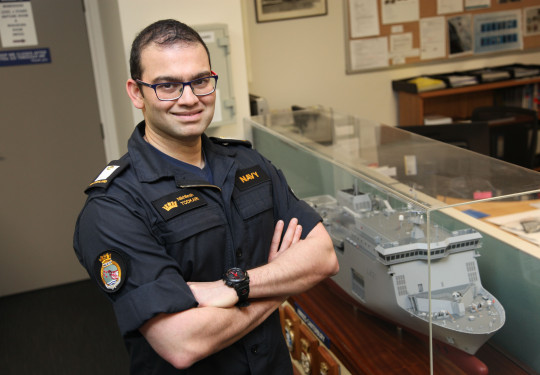Hutt Valley GP takes up call for doctors in the Navy
A busy Hutt Valley GP is taking advantage of a new Royal New Zealand Navy (RNZN) initiative to grow its ranks of professionals in its Naval Reserve force.
03 October, 2022
Dr Nikhilesh Todkari, who works at Ropata Medical Centre in Lower Hutt, is part-way through the Naval Reserve Common Training course and will graduate as an officer in April.
It’s a new course designed to ensure Naval Reservists are trained to the same standard as their regular force counterparts, but in a way that works around their civilian employment.
Midshipman Todkari is among 16 officers and eight ratings, joining them for 10-day residential blocks at Devonport Naval Base.
He also attends once-a-week training at Reserve Unit HMNZS Olphert in Lower Hutt, undergoes remote learning and undertakes some weekend training. He will graduate as a Surgeon Lieutenant.
He spotted the opportunity at a Defence Recruiting stall four years ago outside a medical conference.
Originally from Mumbai, India, Dr Todkari thought a person had to be born in New Zealand to join the Defence Force. He also thought he was too old at 35. Neither of those was the case.
Dr Todkari put an application in that same evening.
“As a doctor I spend time in a clinic – that’s what I know. I asked him about deployments and he told me ‘we need doctors to go to places like the Pacific Islands’. It was the uniqueness and diversity of this role that captured my interest, along with the privilege of serving the country.”
He initially considered joining the regular forces, because his wife was looking at work in Auckland. In the end she landed a job in Wellington, but the Navy idea stuck.
“Someone suggested the Naval Reserves. I could still be based in Wellington, without having to leave my job or relocate the family, but I could attend the reserve unit every week and fly up to Devonport for duties. That sounded perfect!”
The course is ab initio – from the beginning – training. The residential phases cover drill, early morning activities, physical training, daily Colours and Sunset ceremonies, amid a packed schedule of deliberately tight timings, late nights and plenty of cleaning and ironing.
Throughout the year, the recruits study the military justice system, the Law of Armed Conflict, sexual ethics, resilience and Lead Self.
He has found the training a steep learning curve.
“I don’t know of any other doctor going out in the weekend to train to shoot, for example.
“There are some on the course who have commissioned from the ranks, and they’re used to it, whereas I’ve probably got the least amount of Defence Force experience. It’s like going back to school again. The language is different, traditions are different, customs are different. I have to work twice as hard to keep up, and that’s been my biggest challenge.”
The instructors were very good and very patient, he said.
“They explain everything. But the onus is on you to do the hard yards.”
He said his role could be across all services.
“I’m not just constrained to Navy deployments. It could be an Army deployment.
“The great thing about this is that it allows me to keep my home base and the job I have. I can go on deployment, do a job, come back home. That’s the beauty of a reserve job, and it definitely suits me.”
